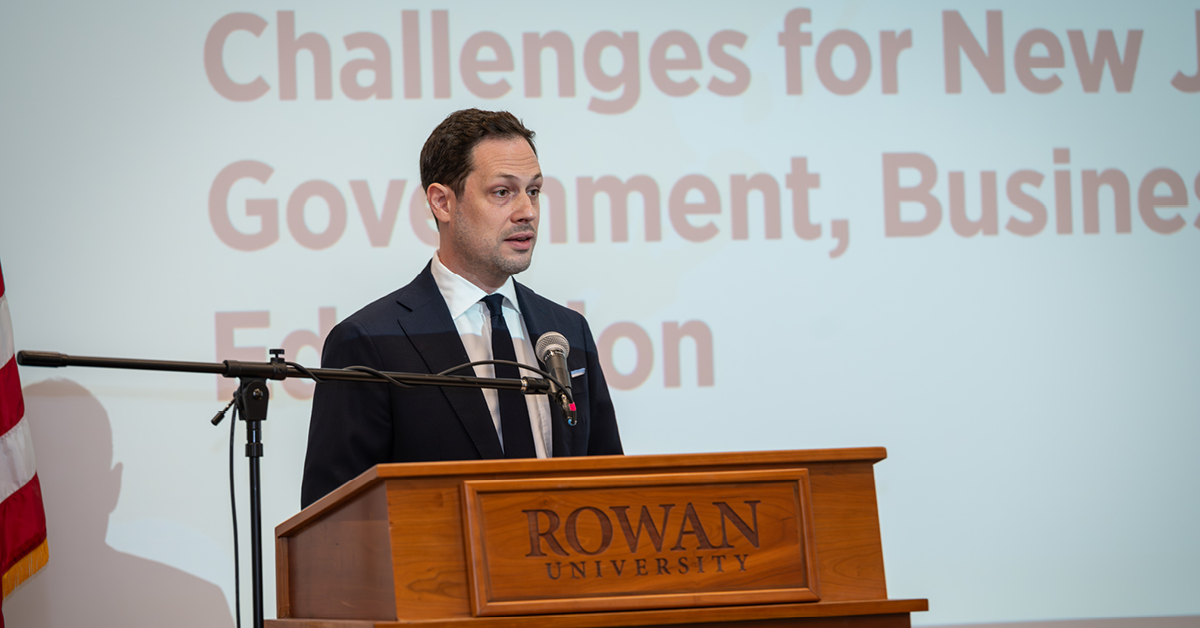At Sweeney Center conference, experts discuss the future of AI
At Sweeney Center conference, experts discuss the future of AI

As experts explored applications of AI in the workforce during “Artificial Intelligence: Challenges and Opportunities for New Jersey Government, Business and Education” at Rowan University last month, they made—and challenged—several claims.
They largely agreed on two points: AI’s potential to have a transformative impact on how society uses technology and the importance of safeguards.
“If you are in any industry, if you do any profession, if you live in the world, artificial intelligence is going to touch how you exist,” said Tim Sullivan, CEO of the New Jersey Economic Development Authority and co-chair of the state's AI Task Force.
The conference, presented by the Steve Sweeney Center for Public Policy, was co-sponsored by the College of Humanities and Social Sciences and the Machine and Artificial Intelligence Virtual Reality Center in the Henry M. Rowan College of Engineering.
In presenting his vision for the medium- to long-term future, Princeton University Professor Arvind Narayanan, author of “AI Snake Oil: What Artificial Intelligence Can Do, What It Can't and How to Tell the Difference,” distinguished between innovations in AI models and the diffusion of AI-powered products into the economy and public sector.
“Regardless of how powerful the technology is, this is going to happen at human speed, not at the speed of tech development,” Narayanan said. “Adoption is fundamentally constrained by the speed at which people can change their habits.” Often, he noted, that takes decades.
“Most jobs have been augmented instead of replaced with the internet,” Narayanan said. “This is most likely what is going to happen with AI.”
New Jersey’s potential as an AI hub
New Jersey State Chief Innovation Officer Dave Cole discussed the Office of Innovation’s role in Gov. Phil Murphy’s multi-pronged initiative to put the state at the forefront of artificial intelligence.
“The goal was to enable responsible use of generative artificial intelligence to solve our most complex and pressing problems”—including issues of climate challenges, education and economic inequality—and to explore “ways the state could take advantage of artificial intelligence to train the workforce, incentivize economic development around artificial intelligence and make sure we have the right safeguards from a policy perspective,” Cole said.
To that end, “the state has undertaken a series of efforts to make sure that businesses in New Jersey have the resources they need to compete and attract world-class organizations,” Cole said, noting that these efforts have made the state “a magnet for AI investment and incentivizing new developments and new ideas around the commercialization of artificial intelligence.”
AI’s impact on the economy
As numerous experts at the conference noted, businesses are closely following AI’s evolving potential.
“Customers want to build new things, and they want to build them fast,” said Julian Busch, research scientist in machine learning and AI with Siemens Technology. To address “more and more complex customer demands,” Busch said, “we need to be faster, more flexible, scalable and attractive to the workforce.”
At his IT company PCS, President and CEO Anthony Mongeluzo, ’02 said, “We’re using AI to empower our team members and turn very smart people into smarter people with the right tools.”
Although he works with some “visionary CEOs that want to automate everything,” Timothy Guim, CEO of managed IT firm PCH Technologies, said, “you can't make that happen overnight. You have to crawl, walk, then run.”
Confronting the challenges posed by artificial intelligence
Experts discussed issues ranging from the immense energy needs required to power machine learning technology to implicit biases in AI models, security issues and ethical use.
Senator Andrew Zwicker, chair of the Senate Legislative Oversight Committee, acknowledged having “deep concerns” about aspects of AI technology, including privacy and inherent biases. Noting that AI platforms like ChatGPT use 10 times more electricity than a Google search, Zwicker also raised concerns about energy needs.
“We want to make sure that we have the energy infrastructure,” he said. “Today, AI and data centers are consuming about 5% of New Jersey's electricity, and that is projected to double within a few years.”
Experts addressed various safeguards that can mitigate the challenges.
“With AI becoming a bigger part of our lives every day, we try to make sure that we’re innovating within an ethical manner to effectively boost our state’s economy and workforce,” said Robert Asaro-Angelo, commissioner of the New Jersey Department of Labor and Workforce Development. Asaro-Angelo said his work focuses on “keeping humans at the heart of the work.”
AI at Rowan
Through a demonstration of an AI teaching assistant, Nidhal Bouaynaya, Rowan’s associate vice president for artificial intelligence, showed conference attendees “how AI can save education.”
The assistant allows students to request lecture summaries, visual explanations and translations of course content into any language.
“AI is already here. It is changing the way we live, work, learn and educate,” Bouaynaya said. “At Rowan, we recognize that AI ethics should be an integral part of our AI strategy. Our approach is to implement guardrails, transparency and a responsible and ethical AI.”